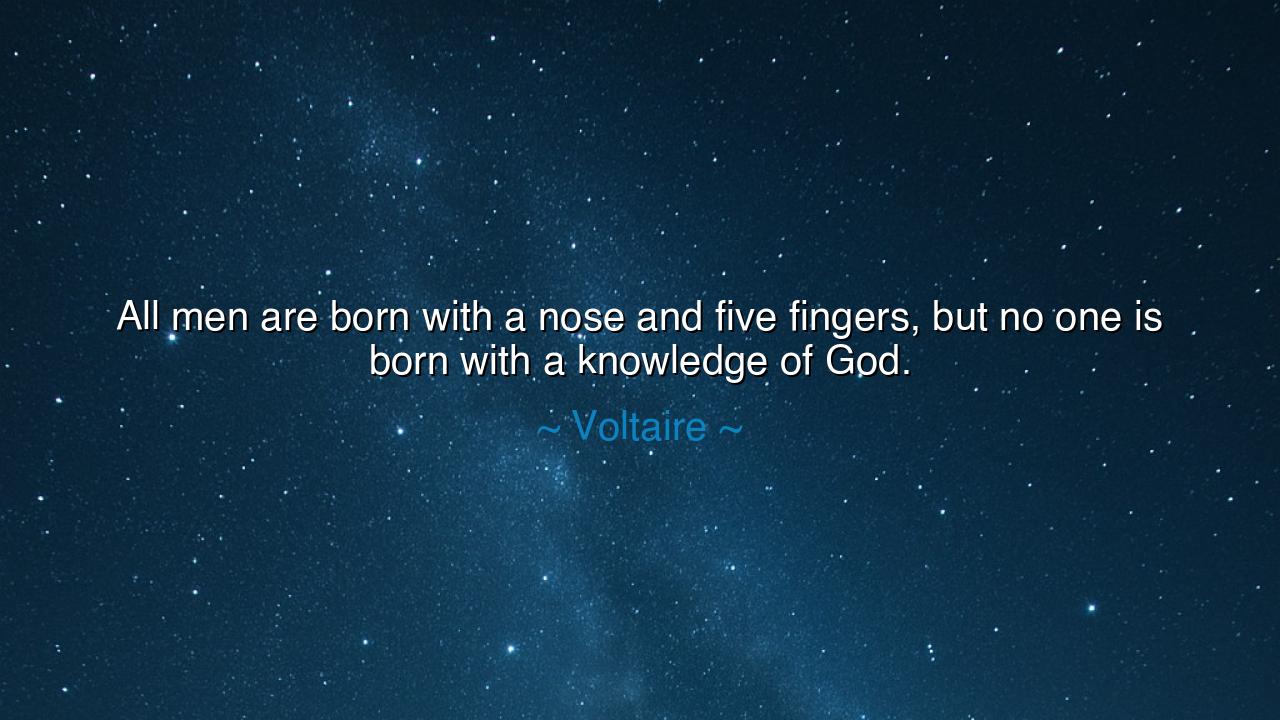
All men are born with a nose and five fingers, but no one is born
All men are born with a nose and five fingers, but no one is born with a knowledge of God.






The words “All men are born with a nose and five fingers, but no one is born with a knowledge of God” were spoken by Voltaire, the brilliant yet controversial philosopher of the Enlightenment. In this simple yet piercing statement, he sought to awaken human beings from the illusion that divine understanding is instinctive. He reminded us that while our bodies come fully formed into the world, our souls do not. Knowledge of the divine — the awareness of the infinite — must be discovered, sought, and earned through reflection, experience, and humility. Voltaire’s words echo across centuries like a bell calling the human mind to awaken, to question, and to rise toward the light of truth.
Voltaire lived in an age when dogma and superstition ruled the minds of men as surely as kings ruled their nations. He was no enemy of God — he was an enemy of ignorance masquerading as faith. To him, this quote was both rebuke and revelation. He declared that belief without understanding is no virtue; that true reverence for the divine begins not in blind acceptance, but in the labor of thought. Just as a child must learn to speak and walk, so must the spirit learn to recognize the voice of God — not through inheritance or ritual alone, but through inquiry, compassion, and contemplation.
The ancients would have understood this truth well. Even Socrates, long before Voltaire, confessed that he knew nothing except his own ignorance — yet it was that humility that opened him to the wisdom of the divine. For to know God is not to memorize a creed, but to stand in awe before the mystery of existence, to see in the structure of reason and the beauty of the world a reflection of something greater. Thus, when Voltaire said that no one is born with this knowledge, he meant that faith without thought is empty, and thought without faith is incomplete. The soul’s greatness lies in its journey toward understanding.
History offers a thousand examples of this awakening. Consider the story of Blaise Pascal, another Frenchman of intellect and faith. He too was not born with the knowledge of God; he sought it through mathematics, philosophy, and science. Yet, in the quiet of one night, overwhelmed by a sense of the divine presence, he wrote the words “Fire! God of Abraham, God of Isaac, God of Jacob — not of the philosophers and scholars.” In that instant, knowledge and experience united — reason bowed before mystery, and the human mind touched eternity. Pascal’s revelation embodied what Voltaire sought: that man must seek to know, and in seeking, he may finally encounter the divine.
The heart of Voltaire’s message is not cynicism but invitation. He is saying to every soul: “Do not assume you know. Search, question, wrestle, learn.” For what is easily inherited is rarely deeply understood. True knowledge of God requires effort — the tearing away of prejudice, the humbling of pride, the opening of the mind to wonder. Those who claim to know without ever questioning have built their faith upon sand; those who seek, even in doubt, build upon rock. Faith is not the absence of inquiry — it is inquiry carried to its highest point.
This teaching carries a moral power beyond religion. It tells us that every soul is born ignorant but capable — that wisdom is not a gift given to a few, but a destiny available to all who strive for it. Just as no man is born with art in his hand or poetry in his tongue, none is born with God in his mind. We must earn our understanding through compassion, through service, through the discipline of truth. In doing so, we honor both reason and revelation, both the mind that questions and the heart that believes.
So let this be the lesson: knowledge of God — or of truth, goodness, and beauty — is the highest fruit of conscious effort. Do not envy those who claim to have found it; rather, take joy in the seeking itself, for in that journey the divine is already near. The path to wisdom is the path to God — not through birthright, but through awakening. For though all men are born with flesh, only the few who dare to think and love deeply are reborn in spirit.
Practical actions: Question what you have been taught — not to destroy faith, but to purify it. Study the great thinkers and saints who sought truth before you. Sit in silence and listen to the voice of conscience. When you see beauty, recognize it as a sign of the divine. When you meet ignorance, answer it not with anger but with light. For each act of learning, each act of kindness, each act of honest reflection brings you closer to what Voltaire called the greatest discovery of all — the knowledge of God, not inherited by birth, but attained by the awakening of the soul.






AAdministratorAdministrator
Welcome, honored guests. Please leave a comment, we will respond soon